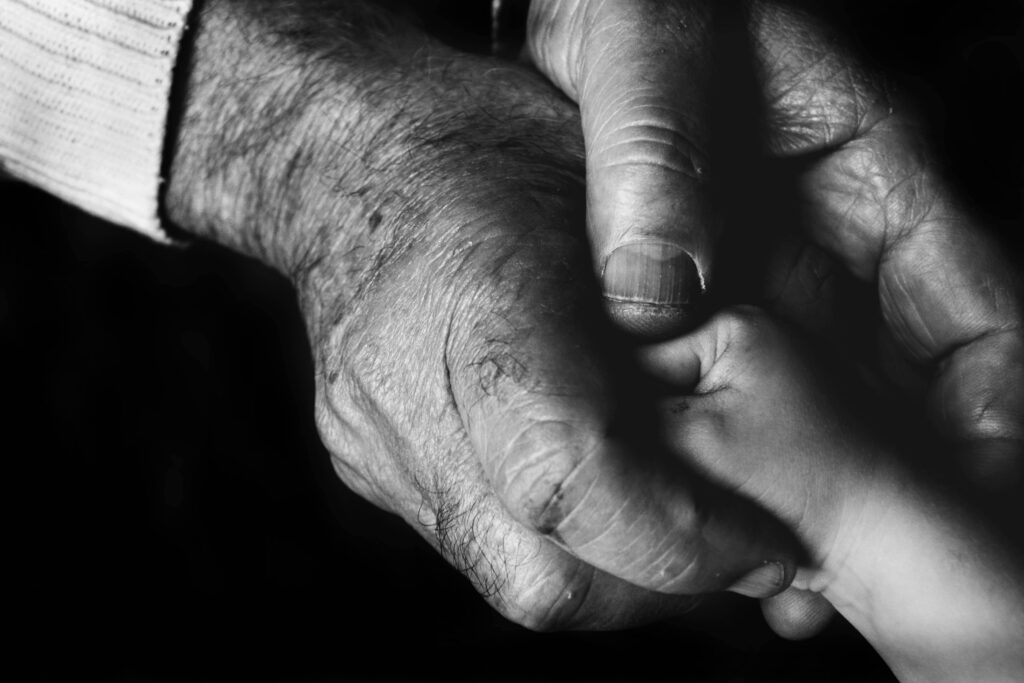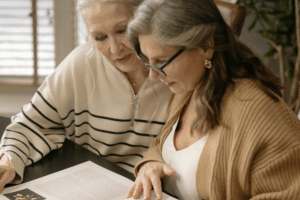“What you do for yourself dies with you when you leave this world.
What you do for others lives on forever.”
~ Ken Robinson, author and speaker
As we move through life, we each weave patterns that endure long after we take our final bow. For most of us, the notion of “leaving a legacy” will emerge at some point on this journey, but what does that phrase really mean?
The concept of “legacy” is often cloaked in grand ideas of wealth and monumental achievement, but its essence is rather more humble. Legacy, at its core, is the distillation of the memories, impacts, and changes that an individual instigates in the world and in the lives of others. It lies in the imprints that we leave on their hearts and minds, and it is both a gift and a responsibility—a chance to contribute something of enduring value that transcends our own lives.
For some people, the idea of legacy can seem too nebulous to grasp. For others, it can feel unsettling or even morbid. The reality of leaving a legacy, however, can be disarmingly simple and positive. All it requires, at first, is some reflection. Thereafter, you can set about building your chosen legacy, whether by imparting wisdom, nurturing others, or protecting something dear to you. Do that, and you’ll be building bridges from your past to the future.
In this article, we explore some of the profound ways in which our actions, ideas, and the love we share can become our lasting legacies.
Understanding legacy
For many of us, the word “legacy” suggests the tangible remnants of a life lived: wills, bequests, money, property, and other material assets left to next of kin. This understandable interpretation frames legacy within the narrow confines of financial and physical inheritance. Rooted in centuries of tradition, it quantifies the worth of a legacy by the sum total of a person’s assets. This notion is important for the welfare of loved ones, of course, but it represents a fraction of the broader and more profound scope of legacy.
A legacy can transcend simple bequests of material assets. We can each consciously craft our legacies through actions, words, and the values we champion, and they can endure for the benefit of future generations long after our physical presence fades from view. This broader definition of legacy encompasses the personal—the lessons taught to our children, the kindnesses shared with strangers, the art created for others to enjoy—and the societal, seen in the actions that shape communities. It’s about the difference that each life can make, in the present and in the future, and at any level from the personal to the global.
Historically speaking, legacies have been left by individuals from all walks of life. In the arts, figures like Leonardo da Vinci and Frida Kahlo bequeathed works that have never stopped inspiring awe. Their creativity and vision transcended the boundaries of their time into the present day and will endure long into the future. Scientists such as Marie Curie and Albert Einstein altered the course of history with their discoveries, leaving legacies of knowledge that propelled humankind forward. In public service, leaders and activists like Mahatma Gandhi and Rosa Parks showed how dedication to a cause can ignite social change, their philosophies and actions laying the groundwork that subsequent generations have built upon.
For every monumental contribution that shifts the course of history, however, there are thousands more quiet and everyday acts that help shape a closer, more connected, and more informed world. Charity volunteer work, parental sacrifices, the empathy of a good Samaritan, business mentorship, the choices of the environmentally conscious and the actions of those who support small companies and local artisans … Such acts might seem modest, but each one builds a different kind of legacy—a legacy that goes beyond material wealth to impact or inspire others.
Every one of us, therefore, has the potential to leave a meaningful legacy and to have our lives echo far into the future.
Personal legacies
Some of the most enduring legacies are rooted in the values, wisdom, and knowledge that each generation passes to the next. The values instilled in us by our forebears—integrity, compassion, and respect, for instance—serve as our moral compass, influencing our decisions and actions. This transfer of ethical codes and beliefs is a subtle yet powerful form of legacy.
Similarly, the wisdom and knowledge of our ancestors helps us to navigate the complexities of modern life. Their narratives serve as records of events, encyclopedias of information, and repositories of emotion, thought, and experience. They offer insights into challenges and triumphs, failures and achievements, and moments of doubt and pain, and they too are a crucial aspect of legacy.
Perhaps the best way to think of these intangible legacies is as invisible threads that connect the generations and form the backbone of our families and societies. They provide the stories, the knowledge, and the guiding principles that inform, inspire, and shape us. They offer a sense of identity and belonging, and they help us to understand where we came from. As such, it is difficult to overstate their importance.
This sharing of values, wisdom, and knowledge can take many forms, from oral histories passed down within families to written memoirs that capture the essence of an individual’s life. Whatever form it takes, each narrative contributes to the tapestry of human experience and is a vital part of the sharer’s legacy. It serves as a reminder that everyone has a story worth telling and a unique contribution to make to the collective memory of humanity.
Tangible legacies
While the intangible aspects of legacy—values, knowledge, and personal narratives—hold profound significance, the act of creating something lasting can anchor our legacies in the physical world.
The impact of these creations can be truly significant. Participating in projects that address social issues or enhance someone’s quality of life will leave a legacy of positive change. Similarly, in an era defined by the need for sustainability, the nature of the environmental legacy that we leave has never been more critical. Actions such as planting trees and engaging in conservation efforts play a crucial role in preserving our world for generations to come.
The beauty of leaving a tangible legacy, in whatever form it takes, lies in its visibility and in the direct impact that it has on the world. Whether through fostering innovation, preserving the environment, or writing the story of your life, these legacies are pillars upon which future generations can build.
The role of relationships in shaping legacy
At the core of every legacy—tangible and intangible—lies an intricate web of relationships through which we influence the world and etch our position within it. Connections with family, friends, and community are the channels through which we transmit values, preserve traditions, and cherish memories, and the strongest legacies are built on a foundation of meaningful relationships.
Parents and elders, for instance, pass stories down through mentoring within the family, instilling values and wisdom that stand the test of time. These interactions help to form an individual’s character and to influence the legacy that they, in turn, will eventually leave. Similarly, by engaging with our communities—perhaps through volunteer work or by simply being a supportive neighbor—we can all extend the reach of our legacies and transform them from personal footprints into something bigger.
Legacy-building comes through in countless other relationships as well. Through leadership, teaching, and everyday interaction, we can each wield an influence that sparks change, ignites passion, or empowers others. If you’re a leader, you can inspire colleagues or followers to lead with compassion or decisiveness by modeling those values. If you’re a teacher or a mentor, you can plant seeds of curiosity and knowledge that will continue to grow long after your direct influence wanes. Even casual interactions can have a lasting legacy as the kindness, encouragement, and understanding that you show to others ripples outward and touches lives in ways that you might never fully comprehend.
The essence of legacy, therefore, lies not solely in the achievements that we amass or the wealth that we accumulate but in the quality of our relationships, actions, choices, and behaviors. It’s right there in the smiles we share, the support we offer, and the wisdom we impart.
Planning and building your legacy
Creating a meaningful legacy isn’t something that you can do in snatches of free time or leave to linger on the backburner to be worked on later. Legacy planning demands time, intentionality, and conscious, deliberate action.
Here are some practical tips on how to discern, plan, and build the legacy you want to leave.
Reflect
The process of building the kind of legacy that appeals to you must start with reflection. Reflection is more than just a contemplative exercise—it’s a crucial first step. Without it, your legacy will be inadvertent, incoherent, and unplanned, full of serendipity and unintended outcomes.
So, pause for a while and spend time reflecting on the values you most cherish and the kind of legacy that you wish to leave.
Live intentionally
The foundation of a lasting legacy is often laid in small, everyday actions. A kind word to a colleague, a commitment to self-improvement, a positive behavior modeled; each is a new brushstroke on your canvas of intentional living.
So, consider how you currently live and interact with those around you and try to identify ways in which you could change to better embody and support the values and causes you care about.
Then, set yourself some clear goals—volunteering a certain number of hours each month, for instance, or mentoring a group of young professionals—to align your daily actions with the legacy that you aspire to create. Do this, and you’ll be “living your legacy“.
Regularly reassess your goals and your progress toward them to ensure that your efforts remain on target.
Make a difference now
Every day offers new opportunities to craft a legacy that is rich with meaning and purpose, to influence and inspire, to strengthen relationships, and to make a difference that echoes into the future. Carrying out simple acts of kindness, advocating for change, and living in a way that respects the wellbeing of others will have ripple effects that extend far.
So, engage with your family, your friends, and your community; share your knowledge widely; make a start on the building project you’ve been delaying. Whatever actions you take, be a force for positivity in the lives of those around you.
Document your journey
Documenting your life’s journey is an often-overlooked aspect of legacy planning and a way to etch “now” into “forever”.
Keeping journals, writing letters, and recording stories will provide you with more opportunities for personal reflection and provide you and your readers with insights into your challenges, triumphs, and experiences. Sharing these is a way to offer guidance and inspiration to others and a means of granting them the opportunity to learn from you, to feel connected to you, and, perhaps, to find inspiration or solace in your life’s journey. In doing so, you will “humanize” the values and beliefs that you stood for, making your legacy relatable and accessible to your loved ones and the generations to come.
Key points
Legacy can be a matter of money, property, and material goods but also of wisdom, values, knowledge, and memory. It is as much a fixed “thing” as it is a dynamic, evolving process.
At its heart is the idea of making a difference. This might mean a financial difference, but it can also mean living in a way that inspires and helps others. In this way, legacies have a profound power to transcend time and physical presence and to leave a positive lasting impact.
Because legacies are as much about life as they are about death, every action we take, every decision we make, and every word we utter in our daily lives contributes to the legacies that we leave behind. So, as you move forward, take a moment to ponder the legacy that you are in the process of creating right now—consciously or otherwise.
Let your reflection be a catalyst for action. Embrace the opportunity you have to leave a mark that is uniquely yours and to shape the kind of world you want to leave behind. Make the memories that you would like to be remembered by—memories that resonate now and ripple through the future—and create a positive legacy that speaks of who you are and what you stand for.
Your legacy is your story; make it one worth telling.
Written by Steve Edwards, LifeBook Memoirs editor








